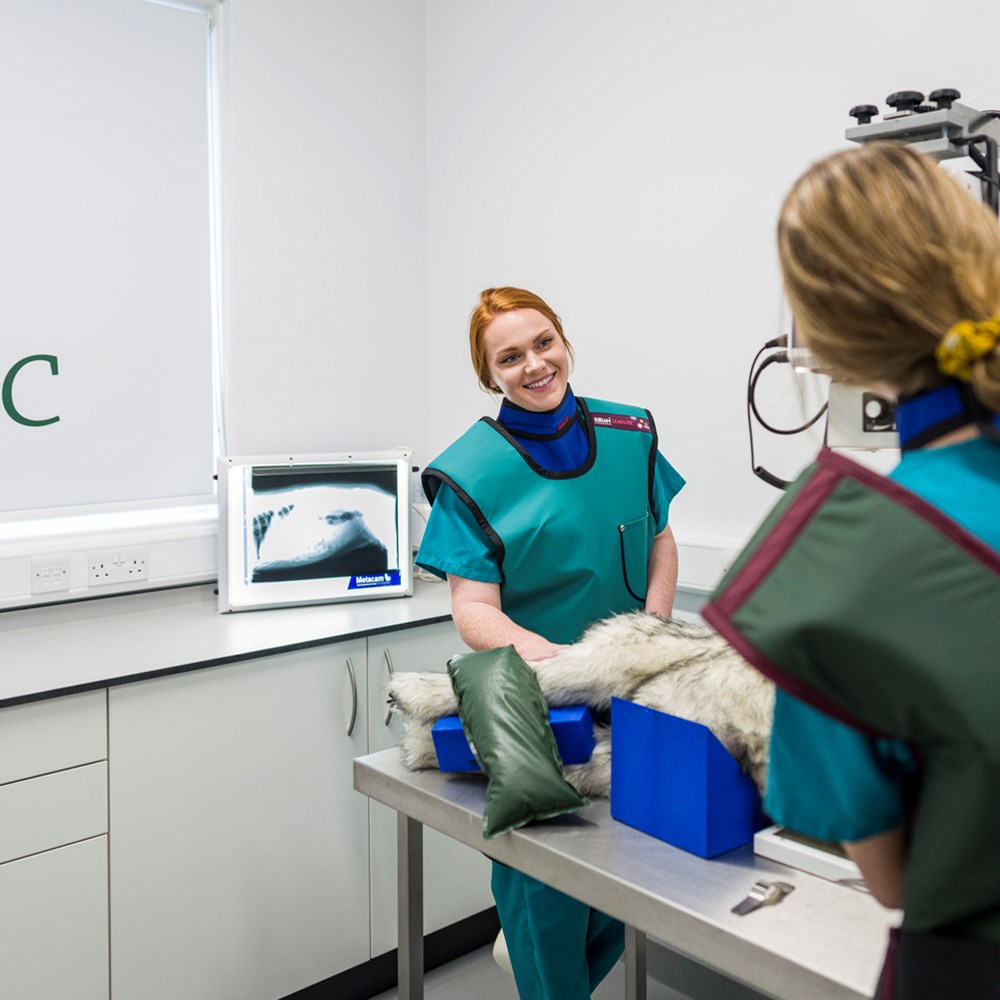What to expect
There are special features of studying on the BVSci programme that are different to a typical degree programme.
Scroll down to discover more

Some features of studying on the BVSci programme are different to a typical degree programme:
Expand the below headings to learn more.
-
Professionals hold a position of trust and responsibility. The BVSci degree is delivered under the authority of the Royal College of Veterinary Surgeons and can lead to registration to practice in the UK.
Fitness to Practise is about students demonstrating, in both their professional and private life, that they can practise their profession properly, safely and with respect for the trust and responsibility placed upon them.
Students are subject to upholding a Code of Conduct, which is signed annually, and outlines expectations that cover their studies and their private lives. Breach of the Code of Conduct will precipitate disciplinary and potentially internal Fitness to Practice investigations.
-
Membership of the Royal College of Veterinary Surgeons is not automatic following graduation from a recognised veterinary programme. However, application for registration with a recognised degree means that applicants do not have to take further examinations.
Application to enrol with the RCVS after successful graduation will involve a declaration of any cautions, convictions or adverse findings which may affect registration.
Any applicant to the BVSci should familiarise themselves with the RCVS protocols if they have any concerns (What am I required to disclose to the RCVS? - Professionals). Importantly, as Veterinary Surgeons are members of a Regulated profession the legal framework regarding convictions differs significantly from the general population. An ‘adverse finding’ includes any finding within veterinary school or university Fitness to Practise procedures. To clarify, the RCVS only requires disclosure where a panel finds that the case against the student is proven and their fitness to practise is impaired. They do not need to know about cases that do not reach a fitness to practise panel or those that are dismissed by a panel.
We are committed to encouraging a more diverse cohort of students to take up veterinary degrees. Therefore, the School does not wish to deter those applicants with criminal convictions from applying. The School seeks to balance equally its commitments towards applicants, including those with criminal convictions, with its obligations to provide a safe and secure environment for the wider communities of the Universities as well as recognition of the requirements for fulfilling the Royal College of Veterinary Surgeons (RCVS) registration process. Once an applicant has an unconditional firm place for the BVSci course they will be required to complete a Criminal Convictions and Conduct Questionnaire.
Please note, the purpose of this form is simply to ensure we are aware of any potential Fitness to Practice issues prior to enrolment onto the programme. This will allow us to have any confidential discussions with you and will enable you and us to make an informed decision regarding your suitability for our programme.
If any applicant wishes to discuss any unspent convictions before submitting an application, they should contact the Admissions Team (SVMadmissions@sruc.ac.uk).
-
See our 'Extra mural studies' section for more information.
-
SRUC is committed to designing learning to be inclusive, meeting the needs of our learners, and creating learning environments where all learners feel valued and have an equal opportunity to learn. This includes a commitment to ensuring that it meets its’ legal duty to make reasonable adjustments in line with the requirements of the Equality Act 2010.
The aim of Reasonable Adjustments is to ensure that all students are able to demonstrate the full extent of their academic abilities, irrespective of a disability or long-term condition.
All SRUC programmes require students to reach specific academic standards in order to be awarded their qualification and some also have particular competency standards associated with professional accreditation e.g., the Veterinary Science (BVSci) and Veterinary Nursing programmes or other regulated qualifications. SRUC will not reduce or change those standards, but it is committed to ensuring that the methods of assessing those standards do not put disabled students at a disadvantage, where possible.
While SRUC is committed to supporting disabled students in line with its legal duties, those who do not declare a disability on application, which later becomes apparent during their studies may be at risk of not achieving the programme if they cannot meet the required competence standards. Further details are available in SRUC’s Reasonable Adjustments Policy
Potential applicants for the BVSci programme should make themselves aware of the RCVS Day One Competences that are required of individuals graduating from a veterinary programme. Individuals who have specific concerns are encouraged to contact the School of Veterinary Medicine Admissions team for confidential advice (SVMadmissions@sruc.ac.uk).
Students are encouraged to declare a disability or other long-term medical or mental health condition during the application process so that SRUC can evaluate their ability to meet the required competence standards and start to plan for support as soon as possible. Once an applicant has accepted an unconditional firm place BVSci programme they will be required to complete a Health Questionnaire. This is particularly important for accredited and/or regulated qualifications. Students who have identified support needs on their applications/Health Questionnaire are considered in relation to Reasonable Adjustments that are required. In the very rare circumstances where a registrants ability to meet the RCVS Day One Competencies is compromised because a Reasonable Adjustment cannot be made their offer will be regretfully withdrawn. Students with agreed Reasonable Adjustments are collated by the Admissions Team. This information is then shared with relevant student support teams and teaching teams.
If any applicant wishes to discuss any aspect before submitting an application, they should contact the Admissions Team by email (SVMadmisisons@sruc.ac.uk)
